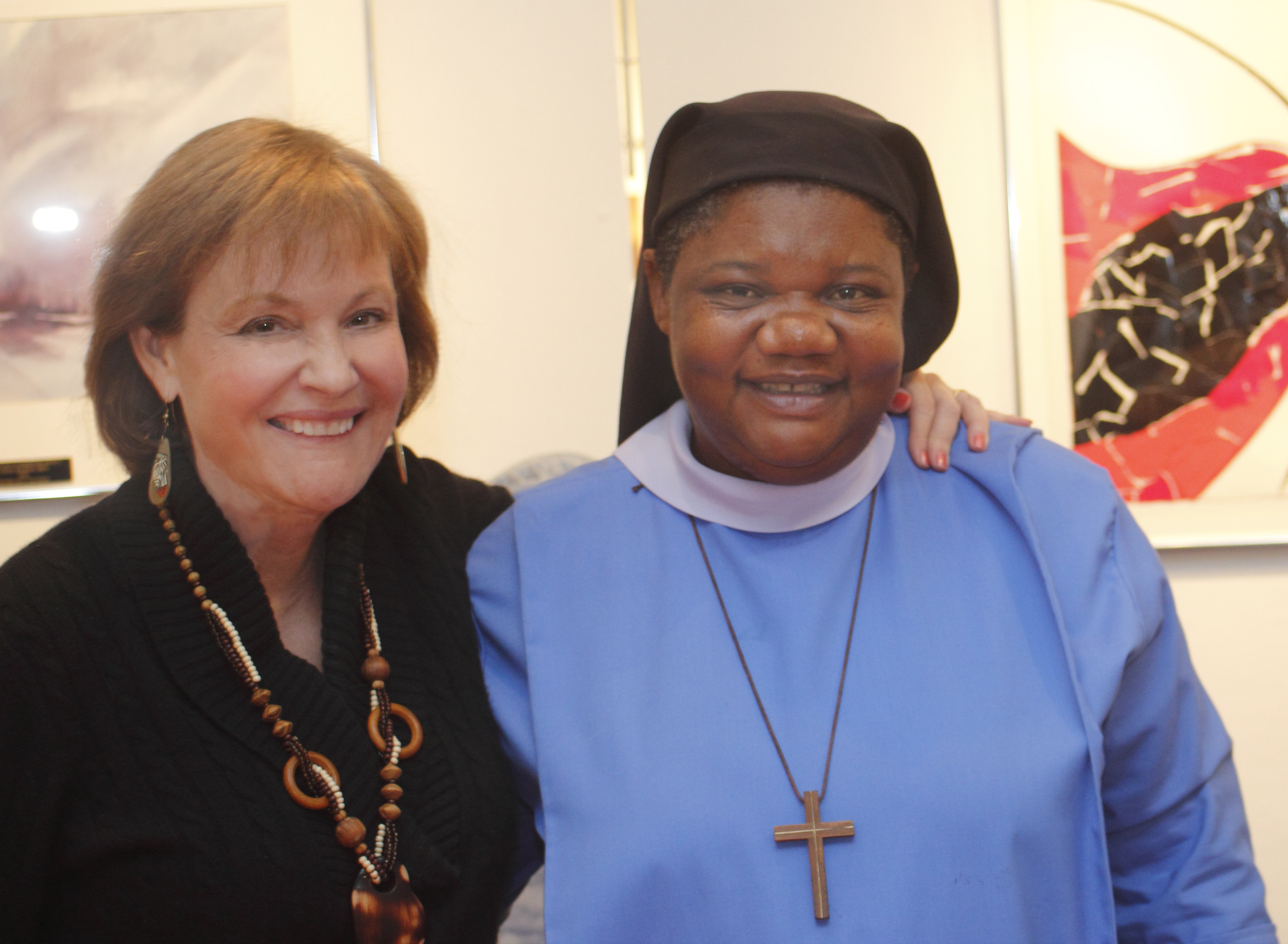![]()
"I Am That Child" Tells Story Of African AIDS Orphans
March 1, 2012 | By Ken Baumel of the Pike County Dispatch
MILFORD — Two women, Elizabeth Geitz of Shohola and Sister Jane Mankaa of Cameroon, West Africa, are sisters in faith who joined forces to help African orphans. The Rev. Canon Geitz documented Mankaa’s story in “I am that Child, Changing Hearts and Changing the World,” a paperback book from Morehouse Publishing.
The book launch party and fund-raiser were held at Artery art gallery on Broad Street in Milford Borough last weekend. The book prominently focuses on Mankaa, her orphanage, and the orphans. It also includes what Geitz termed “My reflections, as a person concerned about faith and social justice, on what I encountered at the orphanage.” Mankaa, who was at the launch, said, “We are the largest of eight orphanages located in northwest Cameroon. Our country has almost 20 million people.”

A book by Shohola resident Elizabeth Geitz about the founder of a West African orphanage for children whose parents died from AIDS has triggered an avalanche of local responses in just a few days following a book launch and fund raiser held at The Artery in Milford Borough. From the left, author Geitz, an Episcopal priest, and orphanage founder Sister Jane Mankaa at the book launch. Photo by Ken Baumel.
Of her book, Geitz said, “This is a non-fiction narrative that reads like a novel. I took a digitized tape recorder on my trip to the orphanage in 2008. I took the recorder everywhere, even to meals. Seven orphans’ and Sister Jane’s stories are recorded in the book.” Geitz is a retired Episcopal canon affiliated with the New Jersey Episcopal Diocese. Prior to entering seminary, she worked for five years in inner-city Trenton helping African American welfare moms get their high-school equivalency diploma.
Geitz now serves as Priest Associate for the Good Shepherd and St. John Episcopal Church in Milford Borough. She also writes a monthly religion column for the Pike County Dispatch. Geitz’s friend Mankaa is an Anglican nun and founder of the Sisters of Bethany, based in Cameroon. The order is dedicated to support Good Shepherd Home, an orphanage.
Mankaa said, “Good Shepherd is the only orphanage in northwest Cameroon devoted to children whose parents died of AIDS. We have 50,000 (such) orphans in the northwest. There are over 330,000 orphans in the country.” Mankaa’s order and orphanage are part of the Anglican Communion, the parent organization of Anglican and Episcopal churches and ministries in 165 countries.
“Every diocese in the Episcopal church has a link to an Anglican diocese in another part of the world. So partnering with our brothers and sisters in the world is central to our faith,” said Geitz. Cameroon, a nation as large as California, is located on the west-African coast, sandwiched between Chad and Nigeria. The nation has one of the highest literacy rates in Africa, but suffers from the same AIDS pandemic plaguing most of Africa. This pandemic has created a huge pool of orphaned children whose parents died from AIDS. Mankaa said that orphan life on Cameroon streets is brutal. Kids are subject not only to death from starvation, but to criminal acts, slavery, sex exploitation, and indentured servitude.
Orphans are among the lowest members of society. Even in public school, orphans are treated as pariahs and rarely get the recognition or respect needed to progress. Mankaa wants to change that. She said, “How did I get into starting an orphanage? I was a Presbyterian contemplative nun for 20 years. My ministry was quiet study and prayer. “I was living in the bush area, but one day, I went to a city and saw these orphans starving and dying. They were raising their hands to me. They were begging me to save them. “When I looked into their eyes, I said in my heart, ‘I am that child.’ I decided I wanted to help them. I knew then that I wanted to do more than pray. I needed to combine prayer with service and social action.”
The Presbyterian Church in Cameroon did not have a mechanism in place for Mankaa do something for the children. So, she left their order in the late 1990s to start her new adventure. Geitz said, “Mankaa boarded a plane for America with a dream in her heart, a vision in her head, and $25 in her pocket.” Initially Mankaa’s dream was to find some way to help the children. Her immediate vision was to earn a high school degree, get an Associate of the Arts (AA) degree to learn convent management, and establish credentials. Mankaa first networked with Catholic women of faith in Iowa. While there, Mankaa decided that she was called to be an Anglican nun, a step needed for her to start an orphanage. Mankaa contacted every Episcopal convent to further her studies and start an orphanage.
Only one convent, the Community of St. John the Baptist, located in Mendham, NJ, responded to her and invited her to study there. When Mankaa was making the rounds of churches in New Jersey to tell her story in the late 1990s, she met Geitz, who was then working at one of the churches. Later, Mankaa returned to Cameroon and established Sisters of Bethany, an Anglican Benedictine order. The primary purpose was to build and run an orphanage. Local women bought into her vision for an orphanage. In 2000, Mankaa converted a home she acquired into a convent. Three years later orphans arrived from word of mouth. As part of the orphanage plan, Mankaa dissolved tribal barriers. She said, “We do not turn any child away.” The children appreciate what Mankaa is doing. Geitz said, “The children all call her Mama Jane. They don’t feel like orphans any more … the culture at the orphanage is for children to treat each other as brothers and sisters rather than members of a tribe.” Good Shepherd Home was not accepted immediately. Local witchdoctors cast spells against her, the staff, and the facility. They placed snakes in the building and intimidated the staff while Mankaa was in the U.S. on a fund-raising trip.
Mankaa persisted and overcame the obstacles. She further dissolved deeply ingrained cultural mores involving tribal divisions. Mankaa also weathered a poison attempt by a neighbor who did not want AIDS orphans living in the neighborhood. Already, the first crop of orphans leaving her facility to go to area schools has shown far more progress than teachers expected. She said one orphan, a boy, was living in the bush for his food before coming to her facility. That child is now a star pupil who was recognized by a local teacher as having a brilliant mind. Another orphan wants to be a doctor and a pilot so that he can help children in other areas of the country. Geitz said that not too long ago, Mankaa met Dr. Albert Waldman of Milford at a church event at Good Shepherd in Milford. He has since started a medical school scholarship trust to help children from the orphanage.
The book launch was successful. Geitz story on Mankaa’s vision is already sparking commitment to her social-justice cause. Since last weekend, Milford Township residents Sam and Brenda Ruello and Dingmans Ferry resident Amy Ferris formed Good Shepherd Cameroon 100 Campaign after the book launch to raise funds for the school. Several other people have also sponsored a child at the orphanage. Mankaa’s next project is to expand the orphanage to include a high school in a nearby town. The enthusiasm for learning at the orphanage is growing so high that many are dreaming they can be doctors, teachers, or professionals. She said, “They want to go into fields where they can help others, just as they have been helped.” Mankaa said that the orphanage is doing well. The national government has rated her facility as one of the top such facilities. The orphanage not only serves as a shelter for the children, she has begun an educational program that is attracting positive attention. Mankaa has a farm at the orphanage where she grows chickens. The chickens are use partly to feed the kids and staff, but the farm is also is a fund-raiser for the home. It’s a self-sufficiency project. Geitz helps Mankaa with fund-raisers whenever Mankaa asks for help.
Geitz has written six books previously. All were about ministry subjects, but none about the global missions. She said, “This book just grew. The purpose of the book was to give a human face to the AIDS pandemic. It includes the children’s point of view through their stories. It is also meant to share with the public an awareness of many social justice issues in Cameroon that are typical of most of Africa.” “I wanted the public to share in our journey and discover things I discovered and experience what I experienced. These children have changed my heart and they can change yours.”Geitz helped fund the orphanage and is devoting part of the proceeds of her book signing and launch to Safe Haven of Pike County and part to the orphanage. Proceeds from subsequent sales are to be dedicated to the Mankaa projects. Geitz thanked Safe Haven and Artery artist Debbie Gioello for facilitating the book launch. The Artery had never previously hosted such an event.
The website for donating to the orphanage, trust fund, sponsorship, or food is www.goodshepherdhome.org. For further information and to order the book, go to www.elizabethgeitz.com or visit your local bookstore.







